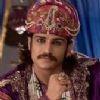Folks,
Being somewhat handicapped at this point of time by the fear that my displaced neck vertebrae might start acting up again, and paralyse me with shooting pain in the shoulders and arms, I am forced to keep this relatively short, by my standards, that is😉! And also to handle the episodes from 16 to 21 in two posts, each covering a different aspect of the show and the characters.
This is the first, that deals with Jalal's coming of age as the Shahenshah, stepping firmly out of Bairam Khan's stifling shadow. The second will be called Requiem for Ruqaiya I, and will deal with the Ruqaiya-Jalal equation as it stands at the point where Ruqaiya 1 steps out and Ruqaiya II takes over. But that is, if I can do it, for tomorrow, and it will cover Episode 21 as well. The other three episodes for this week will be taken up, God willing, on Monday next. They channel does not leave one alone even on Saturdays!
Well, I always start with the best, so let us begin with the splendid, climatic scene where Jalal defies Bairam Khan and asserts his autonomous powers as the Shahenshah-e-Hindustan.
Coming of Age: It was High Drama (with mandatory caps) all through this segment, as Jalaluddin Mohammed, the erstwhile protege of Bairam Khan and de jure Mughal Emperor, finally came into his own, staring down his Khan Baba in a fierce tussle of wills. It was a watershed on the long road that would lead him, and us, to the Emperor Akbar the Great (a patent verbal redundancy, as Akbar itself means 'the Great'), and it lived up to all our expectations and more.
That was not the only moment to remember in an episode studded with them: Jalal burning Jodha's portrait, Bairam Khan self-destructing in a vortex of impotent rage and bitter ranting, Ruqaiya once again showing her mettle as a smooth, subtle intrigante. But it was clearly the high water mark of the evening, and a very high one at that.
The prelude: The way in which Jalal gets to know about the murder of Raja Takhatmal by Bairam Khan is itself an illustration of how fate plays into the hands of (wo)men, in this instance, Mahaam Anga. She is just thru with warning her blockhead of a son to keep his fingers out of l'affaire Takhatmal, and is looking around for a way to convey the fell news to Jalal without her fingerprints being all over it. And lo and behold, the ideal tool just drops into her lap, like manna from Heaven! Exactly as in the case of the blinding of Zaheer, when the hakim came in at just the right moment. Shaitan surely looks out for his own!
As Jalal listens to Takhatmal's soldier pouring his heart out, we can practically feel the rage rising in him like molten lava. The narrowed eyes have a manic glare. A hand clenches on the hilt of his sword and almost crushes it.
Eventually, he stands up, and we see, with somewhat of a shock, that his face is smooth and inscrutable. The rage that was consuming him only moments ago has disappeared without a trace, and as he leans back in his seat, the whole body is loose and relaxed. The change in the body language is as startling as it is eloquent. The Shahenshah has made up his mind, and he knows exactly what he has to do and how.
The tectonic clash:The scene that follows could have been scripted by a Renaissance dramatist. Jalal never once raises his voice, but his level tones have a force and a finality to them that none of Bairam Khan's high pitched rants can command.
When Jalal effectively ignores Bairam Khan even when he has marched right up to the Shahenshah, and issues a stream of orders to rehabilitate the Takhatmal family, Bairam Khan seems to lose it totally. The crude putdowns of Jalal, and the self-glorification he indulges in reach their nadir when he derides the Emperor Humayun as totally ineffective.
Which leads to Jalal making it clear to his former mentor, with unprecedented bluntness, when he asserts his rank as the Wazir-e"Aala of the Mughal sultanat, that
(a) Aur hum is sultanat ke Shahenshah hain.
(b) Aapko faisle lene ka haq humne diya tha.. aapko Wazir-e-Aala ka auda humne diya,
(c)Us insaan ki jaan lekar jisne hamare walid ki jaan bachayi thi, aapne gunah-e-azeem kiya hai, and
(c) that while he would never wage war against his Khan Baba, lekin agar baaghi baghawat karega to yeh badshah apni talwar zaroor uthayega....
The final denouement seems scripted to sum up in itself the essence of the scene. As Bairam Khan is storming out of the Diwan-e-Khas, Jalal calls out Baba! Khan stops, hoping against hope for a reprieve, some shred of pride that he could perhaps salvage. There is none.
Instead, Jalal delivers his final warning: Aapne humein har jung se pehle ek taalim di thi, ki jung jaisi bhi ho, jis se bhi ho, humein har hal mein jeetna hai..Aap ki yeh taalim hum kabhi nahin bhoole hain..Aur na hi bhoolenge...
The double wave: He then sweeps past Bairam Khan and exits, in effect preempting him. Immediately, all the courtiers stream after the Emperor, forming a double wave that flows past Bairam Khan as he stands, still and isolated, in the centre of the hall. It is as if all his vaunted powers were flowing out of him with that double wave, leaving him a hollow shell bereft of all but life.
It was an extraordinarily effective take, this double wave, a superb blending of the vision of the director and the cinematographer. I have rarely seen a scene ended with such elegiac smoothness, the visuals conveying the essence of the climatic change that had just occurred, and this without a word being spoken. Beautiful.
Tunnel vision: The rest of the Bairam Khan track is noteworthy for only two points. One, that he seems still incapable of comprehending that his pupil is now a man, not a biddable boy. He attributes all of Jalal's actions in the Diwan-e-Khas to Maham Anga's tutoring and her tale-telling against himself, and asserts that Jalal would be nothing without him, Bairam Khan. That he would have to choose between his Khan Baba and Maham Anga, and if he chose her, wo bahut pachtayega, bahut pachtayega, kyonki Bairam Khan ke bina wo Jalal to reh sakta hai, Shahenshah nahin!
Truly is it said that there are none so blind as those that will not see!
The second is the entry of Akbar's second wife, at present Bairam Khan's bibi, the gentle, goodlookimg Begum Salima.
The Bairam Khan lexicon: But this tectonic clash did not happen all of a sudden. There was in fact a slow build-up, like the slow boil in a tea kettle, only it was not visible to the person it affected the most, Bairam Khan, who seemed willfully blind to all but his obsession with asserting that :
- Shahenshah se zyada Mughaliya sultanat ki ehmiyat hai, aur Mughaliya sultanat ke tamaam faisle hum lete hain.
- Jalal se hum sawaal karte hain, jawaab nahin dete ( a patently false assertion, seeing how he behaved when Jalal discovered that Bairam Khan was behind the blinding of Zaheer and confronted him!). Aur pehle bhi hum kayi bar Jalal ke wafadaaron ko sabak sika chuke hain...
- Humne use Shahenshah banaya hai.. Bairam Khan ke bina wo Jalal to reh sakta hai, Shahenshah nahin! Kya Jalal ka kad itna bada ho gaya hai?
Zaheer II: After the Zaheer blinding had led to the first clash between Jalal and his Khan Baba, and Jalal's first ever assertion of his will and his feelings, the next push came when Zaheer was found dead in the prison where he had been confined by Bairam Khan, on apparently false charges, presumably to get his own back for the Shalpur fiasco.
Maham Anga, having had Zaheer poisoned using a ring filled with the stuff, a la Catherine de Medicis, now scores a hit off her bete noire, Bairam Khan. And he makes it all the easier for her with his stiff-necked arrogance.
When Jalal asks him why he had had Zaheer imprisoned, Bairam Khan launches into a tirade of self-exculpation and self-glorification: Aapki umr jab 14 baras ki thi, tab se yeh faisle hum hi lete aarahe hain..Aapke walid Mohataram ne aapki hifazat ki zimmedari humein di thi..Humare farzand ki tarah paala hai aapko..Hum aisa koyi faisla nahin lenge jo aapke haq mein na ho.. He stoutly denies that he has done anything wrong, even as Jalal looks at him with level, cold, questioning eyes.
I was in stitches when Bairam Khan was accusing Zaheer of spreading the rumour tha the sultanat was really Bairam Khan's to run, with Jalal being a mere puppet in his hands, for truer words were never spoken!😉
Finally, in an extraordinarily arrogant and insulting gesture, Bairam Khan, after asserting: Hum ne wohi kiya jo Wazir-e-sultanat ko karna chahiye.. turns on his heel and strides out, without, as Maham promptly points out to Jalal, having taken the Shahenshah's permission to retire, or even offered a salutation before he left.She drives the point home with a silken comment, like a hot knife going thru butter. Agar wo aapko dil se Shahenshah maante, to aisa kabhi nahin karte...
But Jalal attaches so much importance to the three crucial relationships in his life (Mahaam Anga's face was a study as Jalal enumerates them, putting her last; the relief that floods her eyes and her whole being at finally making the cut was a sight to see!😉) that he cuts his Khan Baba a lot of slack, far too much for Bairam Khan's own good. Thus, he tolerates Bairam Khan's overt impertinence on this occasion, and what is worse, goes so far as to regret even the mild protest he had made to his mentor - Main unki badaulat hi to hoon.
This remark is a very revealing one as far as Jalal's character is concerned. He is grateful for any and all kindnesses done to him. This is remarkable and rare in a king, for kings have a highly developed sense of entitlement, and see the loyalty and devotion of their followers as no more than their due; gratitude is out of the question. Not so with Jalal, and this is an innate quality that has always been there.
Maham, at this point, must have surely felt like landing Jalal one of her famous, ringing slaps, which rock even a giant like Adham Khan off his feet. But she restrains herself, and instead points out the obvious, something that any monarch but the overly grateful Jalal would have realized: Humne aur Wazir-e-Aala ne aaj tak jo bhi kiya wo hamara farz tha, koyi ehsaan nahin..Hamara aur unka hona aapki taaqat banni chahiye kamzori nahin..
Then she delivers a mini-homily worthy of Chanakya himself: Yeh takht bahut sakht hai, Shahenshah, aur us par baithnewala aur bhi sakht hona chahiye...Mashallah, aapki jooton ka naap bad gaya hai Shahenshah.. Waqt aa gaya hai ki aap apne faisle khud lein..Afwahon ko haqeeqat banne na den..Aur awaam ko bata dein ki Shahenshah ka faisla kisi bhi Wazir-e-Aala ki soch ka mohtaj nahin hai!
Jalal looks brooding and uncertain, but surely Maham's arrow has gone home.
The Takhatmal affair: If I was to pick the second best scene of these 6 days, it would not be the hamaam one over which so many young ladies here were surely in ecstasies (at the risk of being pelted with rotten tomatoes, I would say that Rajat needs to work out more in the gym and try for at least 4 pack abs, if not 6 or 8. Right now, when exposed, front or back, he looks like a very handsome, khaate peete ghar ka ladka!😉 ).
It would be the one in which Jalal, confronted by Raja Takhtmal and learning that his father owed his life to the Raja, thinks deeply, absorbs his Khan Baba's vituperative asides, and falls back on his own ingrained sense of justice when he declares at last: Inhe riha kar do (Note the change, due to the gratitude he feels for the Raja, to a respectful mode- he does not say Isko) .
And he justifies his crossing his Khan Baba with impeccable logic: Agar humne iski jaan li, to awaam yeh samajhegi ki hamare zehen mein hamare walid ki koyi izzat nahin hai... Yeh zinda rahenge..
He nails down this display of independence when, reacting to Bairam Khan's (extremely ill-advised) attempt to browbeat him, he says bluntly Nahin, Khan Baba! This act of self-assertion by Jalal against a man he venerated like a father, amounts to a major shift, and it is all the more remarkable for the contrast to his behavior so far.
But Jalal has had very few in his life so far whom he could see as his own, and he does not want to lose any of them. He is like Shanaya in Student of the Year, he does not like to break a relationship. But this trait, which is endearing in an individual, can, in an emperor, become a major weakness. As it does for Jalal, with both his mentors.
So, even after he overrules Bairam Khan over Takhtmal, Jalal still refuses to think ill of his Khan Baba, till Bairam Khan himself, by his blatant flouting of the Emperor's decision, makes it impossible for Jalal to continue doing so (it is another matter that had Adham Khan not been lurking around when Bairam Khan and his cohorts hang Takhtmal, Jalal might not have crossed this bridge for a while yet. Why is it that Adham Khan, standing there as large as life, is not spotted?).
By the end of the week, this power play had ended: Bairam Khan had destroyed himself thru sheer stupidity and overweening conceit. And the fact that Takhatmal managed to take his revenge on BairamKhan from beyond the grave is exquisite irony.
Jungi riyaaz aur siyaasat: I have rarely seen a scene as dramatic, indeed startling, as the one where Jalal literally hurtles at us, reaching almost out of the frame as he whirls and turns with bewildering speed, his shamsheer tracing arcs that glitter in the sun. He reminded me of nothing so much as one of the whirling dervishes of Turkey. It was a dazzling display of control, at a speed and with a weapon that were both very dangerous.
Though Jalal dismisses Abdul's wise and well-argued warning that Jalal should be wary of the rebuffed Wazir-e-Aala, he does add in the end: Unhon ne hi humein sikhaya hai ki ek Shahenshah ka farman sabse bada hota hai. Aur us sab mein wo bhi shaamil hain.. Yakeen hai humein ki wo hamare is farman ki izzat zaroor karenge..
But of course this touching faith of Jalal's is betrayed, and this forces him to finally cross his own personal Rubicon. And in the process he begins to discover himself and what he is capable of. He is now finally set on the path to becoming Akbar.
A friendship beyond compare: On a different note, I loved the endearing note in Jalal's voice as he asks Abdul: Tumhein maut se dar nahin lagta hai na? And Abdul replies in a classic assertion of love and loyalty: Apni maut se to bilkul dar nahin lagta Shahenshah, par aapke saath kuch bura ho, is khyal se dar zaroor lagta hai.
I have said this before, and I will say it again. The CVs committed an act of unbelievable folly when the dropped Abdul, not just the actor, but the character as well, for no rhyme or reason.
My usual questions:
- Why on earth is the blind and suffering Zaheer lugged all the way from Rajasthan to Agra? So that Mahaam Anga can do her number, thru him, on her three targets?
- How does the otherwise astute Mahaam Anga get the idea that she can foist her son, who does not have a drop of royal blood in him, on the awaam and the court as the Shahenshah? As for the ringing slap she lands him, I did not think that was soapish or excessive.He is obviously very headstrong and equally stupid, and I do not think anything short of that would have had the least impact on him.
That is it for today folks. I left out Jodha completely and she does not fit in here. This post has been an effort, and I hope you feel it was worthwhile.
Shyamala/Aunty/Akka/Di
.























comment:
p_commentcount